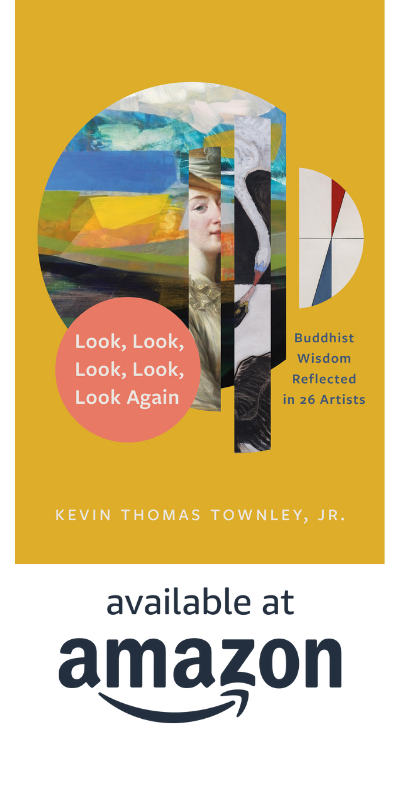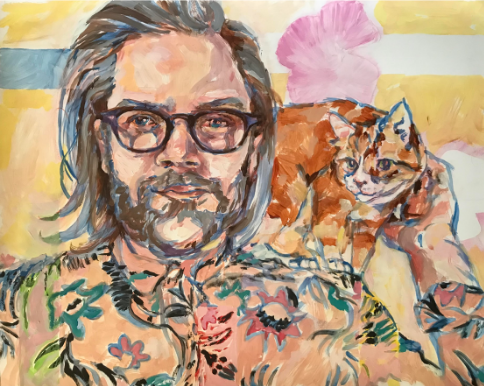Look, Look, Look, Look, Look Again
Buddhist Wisdom Reflected in 26 Artists
Meditation teacher, filmmaker, writer and art savant Kevin Townley turns his unique gaze upon 26 artists and magnifies the power and meaning of the five Buddhist wisdom energies through explorations of their work. Rather than trying to “explain” these energies, he reveals them to you in familiar visual language while, of course, pushing the boundaries of what you might have thought you saw at first glance.
Beautifully written and hilariously disarming, Look, Look, Look, Look, Look Again vibrates with lucid insight into society, history, and establishment, while teaching you a lot about meditation and Buddhism along the way. In exploring the practice, life, and work of these through the lens of the five wisdom energies, you come away with a deeper understanding of yourself, the world, and the true dharma that transcends culture and religion—and a profound gratitude for anyone really willing to look.
Buddha
The Five Buddha Families symbolize the five ways of looking at and understanding the strengths and difficulties in our lives. They describe a continuum of five painful emotions and their attendant wisdoms. At the center of the mandala, the hub of the wheel, is the first Buddha family, conveniently known as…the Buddha family. Appropriately, the classical image that symbolizes this family is the eight-spoked Dharma Wheel, which represents the teachings set into motion by the historical Buddha himself, Siddhartha Gautama. The color of the Buddha family is white; it represents open space, and, similarly, its corresponding wisdom is called “all-encompassing space.” However, spaciousness has a way of devolving into spaciness, and in its confused state Buddha family energy manifests as “ignorance.” You could say that ignorance is the root cause of all of our problems.
Vajra
The Vajra family resides in the east, its color is blue, and its element is water. Vajra’s emotion is anger. It can only take so much incompetence, ugliness, and waste before it blows its stack. When people willfully ignore the itinerary, Vajra is not above whacking someone. Anger can be treacherous, but when we try to cast it out completely, we discard along with it “mirror-like wisdom.” I recently watched a clip of Dr. Martin Luther King, Jr., giving a speech with the sound off. If I hadn’t heard the speech before, I might have assumed, given King’s fiery demeanor, that he was angry. And I’m sure that on some level he was, but whatever relative rage he felt wasn’t suppressed; it was transmuted into the impassioned words he uttered with that thundering voice. That cutting quality of anger, minus hatred, is called compassion.
Ratna
Ratna lives in the south. Its color is a rich, golden yellow, and its element is earth. There used to be a kitschy gift shop in Manhattan’s East Village called Too Much Is Not Enough, which perfectly sums up Ratna energy. The Ratna family is about excess and amassing bling to prove what a hotshot you are. Aside from its tendency toward hoarding, in its confused state, this energy shows up as pride and arrogance. Because we fundamentally think we’re pieces of shit, we start swanning about, giving orders, and engaging others in hydraulic relationships. However, Ratna’s wisdom energy is called equanimity: on some deep level, we know that, no matter what our circumstances, we have enough. Through a dedicated awareness practice we may begin to see that we have access to an inner richness at all times. But in the meantime we have personalities like RuPaul to look up to: a fabulous, glimmering drag queen who has fortified her wealth through fracking. Doesn’t get more Ratna than that.
Padma
To the west, we find Padma, the red fire lotus. This energy is all about seduction. Unlike Ratna, which is occasionally sated as it sleeps off a binge, Padma is always aching, always striving for what’s just over the horizon. This is the American Dream, and it is killing us. While its confused aspect is called “craving,” its wisdom energy is called “discriminating awareness.” In other words, all of the Play Misty for Me stalker energy that knows the placement of each hair follicle on the object of desire can actually apply that discerning eye to compassionate ends. Instead of seducing everyone into your world view, you might use your powers of assessment to bring Nomi and Cristal together on the Doggie Chow campaign, or feng shui your home.
Karma
Lastly, the Karma family in the north. Karma is the element of air, and its color is green. Green with envy, as this is the energy of competition and jealousy. It is always compare-and-despair time for the Karma family person. You’ve always been more talented than everyone else, but somehow you’ve been left behind on the ladder of success and everyone else is laughing at you from their hot tub in Malibu! But you’ll show them! You dug down deep and came up with a highly personal scripted series to pitch to NBC, only to be informed that they just purchased a show just like it…from your ex-wife! And so on and so forth. The fever of competition is cooled by Karma’s enlightened energy: “all-accomplishing wisdom.” In other words, competition is a circular fantasy, and when we are truly awake there is nowhere else to be, nothing else to do. Everything is already accomplished.
ENDORSEMENTS
jUDITH L. LIEF
BUDDHIST TEACHER AND EDITOR OF
THE PROFOUND TREASURY OF THE OCEAN OF DHARMA
His writing is fresh and accessible, and so tender. As soon as I started reading it, I immediately started thinking of friends I’d like to give it to.
jOHN HODGMAN
HOST OF THE
JUDGE JOHN HODGMAN PODCAST
In this book, Kevin Townley pulls off the impossible. He finds, grabs, holds on, and interweaves with lightning speed dexterity the threads of Mandala, Mindfulness and Marshall McLuhan into a brilliant magnum opus on art, the art world, and the meaning of life. Bonus, it’s hilarious. Without a doubt, he is the Fran Lebowitz of Buddhist writing.
CINTRA WILSON
AUTHOR OF
Fear and Clothing: Unbuckling American Fashion
A true treasure map for Buddhist art lovers, or a fabulous introduction to both art and Buddhism for the curious. It is a delightful, impressive accomplishment.
Tavi Gevinson
actor, writer, and founder of
Rookie
Carson Chan
MoMA/Museum of Modern Art
This book has much to teach us about the nature of mind and how it actually affects the physical world.
Maeve Higgins
comedian and author of
Tell Everyone on This Train I Love Them
This book is beautiful and illuminating, sure to make you laugh and feel all kinds of feelings. Townley makes art and Buddhism sing out at us from the pages, making it impossible not to share his wonder and appreciation of the pieces he looks at, again and again.
Elna Baker
This American Life
If you feel lost, confused, caught in the self-help craze, do yourself a favor, and read this book, chock-full of ancient wisdom that will enhance your life and awaken your imagination.
Dave Hill
Comedian and author of
Dave Hill Doesn't Live Here Anymore
Kevin Townley’s new book is beautiful, smart, funny, provocative, and disturbing in the best possible ways, just like Kevin himself. I love the way Kevin writes so much, he could probably write cereal box copy and I’d still be riveted, but I’m glad he chose to write about art and Buddhism instead.
Aparna Nancherla
Comedian
Look, Look, Look, Look, Look Again is a kaleidoscope of a read: endlessly fascinating, deftly recursive, and wickedly funny. Weaving together Buddhist philosophy and art history, Kevin Townley achieves a real high-wire feat here. And since the idea of self is an illusion, I’ll go ahead and congratulate all of us.
Gayle Hanson
Buddhist teacher and artist
There’s no question that when finished I found myself thinking that Kevin would be a delightful companion with whom to wander the halls of the Met. But if that’s not possible, then having this book in your back pocket might be the next best thing.
Sokuzan
Abbot, SokukoJi Buddhist Monastery
An excellent work bringing out a deeper understanding of the Five Buddha families. Kevin Townley sets up an awareness dynamic that allows you to actually enter into the energies. The images he evokes help us proceed on a journey into the underbrush of our own society and from the underbrush right into the museums, into the galleries, into artistic production of artists…and right into our lives. These are brilliant commentaries on the artwork and artists. Needless to say, I learned a lot. Very entertaining, funny and fantastically good.
Copyright © 2022 Lionheart Press/Padma Media, Inc. | Terms and Privacy Policy

